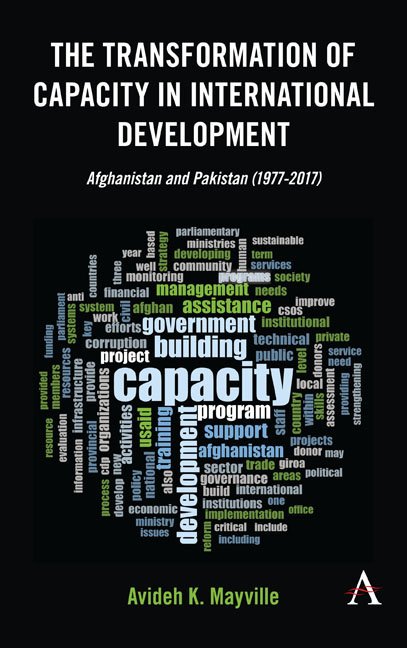Book contents
- Frontmatter
- Dedication
- Contents
- List of Figures
- Acknowledgments
- Chapter One Introduction
- Chapter Two Development Agendas and Donor Spaces: How Capacity Gained Salience
- Chapter Three Capacity in Development Policy and Practice: The Quest for Performance Excellence in the Governance of Disabling Environments
- Chapter Four Capacity and Fragility: The Sociological Framework for the Capacity Project and Developing “Fragile” States
- Chapter Five The Capacity Project in “AfPak”: Development Experiments, Subnational Spaces, and Transnational Networks
- Chapter Six The Battle for Power in Disabling Environments: Statecraft and Developing Capacity in Afghanistan and Pakistan
- Chapter Seven Developing Capacity to Manage Global Threats: Statemaking, the Militarization of Development, and Human Rights Approaches
- References
- Index
Chapter Five - The Capacity Project in “AfPak”: Development Experiments, Subnational Spaces, and Transnational Networks
Published online by Cambridge University Press: 11 December 2019
- Frontmatter
- Dedication
- Contents
- List of Figures
- Acknowledgments
- Chapter One Introduction
- Chapter Two Development Agendas and Donor Spaces: How Capacity Gained Salience
- Chapter Three Capacity in Development Policy and Practice: The Quest for Performance Excellence in the Governance of Disabling Environments
- Chapter Four Capacity and Fragility: The Sociological Framework for the Capacity Project and Developing “Fragile” States
- Chapter Five The Capacity Project in “AfPak”: Development Experiments, Subnational Spaces, and Transnational Networks
- Chapter Six The Battle for Power in Disabling Environments: Statecraft and Developing Capacity in Afghanistan and Pakistan
- Chapter Seven Developing Capacity to Manage Global Threats: Statemaking, the Militarization of Development, and Human Rights Approaches
- References
- Index
Summary
The Tribal Areas Development Project (TADP) has the opportunity to assist in the development of an area of the world relatively untouched for centuries. The tribals abide by a law of their own. They have resisted the advances of other cultures, from the Greeks (under Alexander the Great) to the British. Only in the last three decades has the geographically inaccessible area of the tribal areas reduced … If USAID is successful in TADP, it will be a “first of its kind.” … The problem, then, is how to overcome the constraints of working in FATA while respecting the centuries-old tribal culture and established political autonomy.— USAID evaluation (Williams and Rudel 1988, 142)
What does it actually mean to build capacity in Afghanistan or Pakistan? This question is at the heart of the work of development. There are few cases in the world where a global collision of capitalist and communist projects coalesced with the struggles of postcolonial statehood to create a perfect storm of transnational infrastructure enabling the globalization of terrorism. The situation(s) of Afghanistan and Pakistan reveal an epicenter of global, transnational, and national religious, political, and economic intersection that challenges the very notions of governance that the international system is dependent upon.
Development does not exist in a vacuum. Attempts to consider contextual factors in project design and to make development initiatives locally owned processes, while laudable, are dwarfed by the reality of how development assistance coexists alongside military aid, political alliances, and foreign occupation. These greater macro-relationships between nations engaged in global conflict impact the meso-and micro-level institutional and organizational relationships that make up the so-called partnerships of development. They impact who can be considered a partner, a beneficiary, and where capacity needs to be built.
Projects of development cannot actually be divorced from the transnational tribal conflicts that challenge the structures of market and statehood. Both states have toiled through these struggles of statehood as recipients of development aid. The objective of this chapter is to situate the capacity project within this complexity in order to parse out its meaning and function as a project of development. This chapter is divided into five sections in an attempt to coherently consolidate the complexity of the challenges facing the development of capacity in Afghanistan and Pakistan.
- Type
- Chapter
- Information
- The Transformation of Capacity in International DevelopmentAfghanistan and Pakistan (1977–2017), pp. 109 - 150Publisher: Anthem PressPrint publication year: 2019



